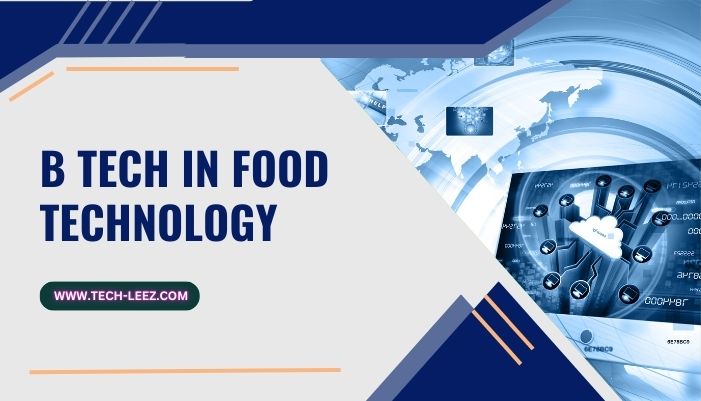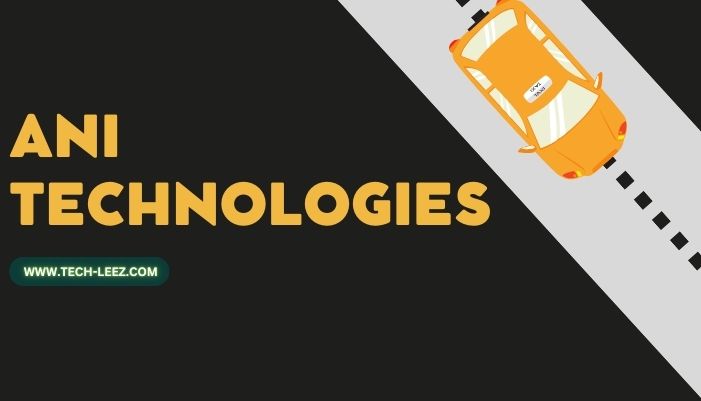If you’re passionate about food, science, and technology, then a B Tech in Food Technology could be the perfect path for you. The world of food is always changing, and this means there are lots of opportunities to help improve food safety, quality, and sustainability. This program combines food science, technology, and engineering principles to create solutions that make food better for everyone. If you want a career where you can make a real difference in the food industry, a B Tech in Food Technology is a great place to start.
In this article, we will explore what a B Tech in Food Technology is, what it includes, and why it’s such a good choice for anyone interested in food, science, and innovation. We’ll also dive into the different job options that come with this degree and why the future of food technology looks bright.
What is B Tech in Food Technology?
A Quick Look at Food Technology
Food Technology is a field that combines food science with technology to improve food processing, safety, and quality. A B Tech in Food Technology is a four-year degree that gives you the skills to work in this exciting field. You will learn how food is made, processed, and packaged. You’ll also study how to make food healthier, safer, and more sustainable.
In this program, students will take courses in food chemistry, food microbiology, food engineering, packaging, and food safety. The goal is to help students understand the entire food production process—from farm to table. It’s about finding ways to improve food and make it safer and better for people all over the world.
The Skills You Will Learn
A B Tech in Food Technology will teach you a variety of skills. You will learn how to test and develop food products, improve food safety, and ensure that food products meet quality standards. This degree also covers the latest technologies in food production, like automation and artificial intelligence. These skills are in high demand as the food industry continues to grow and evolve.
Why Choose B Tech in Food Technology?
A Growing Industry with Plenty of Opportunities
The food industry is huge and keeps growing. The need for skilled professionals in food technology is increasing as people become more interested in healthy food, food safety, and sustainability. With a B Tech in Food Technology, you can work in many areas of the food industry, from food processing to food packaging and even food research.
There are also plenty of job opportunities in the government and private sectors. You could work for food manufacturers, quality control labs, or research and development teams. The food industry is one of the few that will never go away, meaning there will always be job security in this field.
Be Part of the Solution to Global Problems
Food technologists don’t just improve food—they help solve some of the world’s biggest problems. As the world’s population grows and climate change impacts food production, food technology plays a vital role in ensuring that everyone has access to safe and healthy food. This degree gives you the skills to make a real difference in the world by improving food systems, reducing waste, and creating more sustainable food options.
The Versatility of Food Technology Careers
With a B Tech in Food Technology, you have a broad range of career options. The versatility of this degree means you can work in many sectors, including research and development, food safety, nutrition, and marketing. You could also work in education, teaching the next generation of food technologists. Whether you prefer working in a lab, in the field, or at a desk, this degree offers many career paths, each contributing to the growth of the food industry.
Key Subjects in B Tech Food Technology
The Subjects You Will Study
A B Tech in Food Technology covers a wide range of topics to prepare you for a successful career. Some of the key subjects include:
-
Food Microbiology: You will learn about the microorganisms that affect food. You will study how bacteria, fungi, and viruses can impact food quality and safety and how to control them.
-
Food Chemistry: In this subject, you’ll explore the chemical composition of food and how different chemicals in food interact during processing. You will also learn about the different nutrients in food and how they affect human health.
-
Food Engineering: This subject focuses on the mechanical processes used to make food, like cooking, freezing, and packaging. You will learn about heat transfer, mass transfer, and mechanical properties of food.
-
Food Packaging Technology: Packaging is important in keeping food safe and fresh. In this subject, you will study the materials used for food packaging and how packaging affects food quality.
-
Food Quality Control: You will learn how to ensure food products meet safety and quality standards. This is important in every part of the food production process, from farm to table.
-
Food Preservation: Learn about different preservation techniques such as canning, refrigeration, drying, and fermentation. This subject is crucial in ensuring food has a longer shelf life while maintaining its nutritional value and safety.
-
Nutritional Science: Understand the role of food in maintaining health. You will study how different foods impact the human body and how to create balanced diets.
Hands-on Learning and Labs
A big part of this program is the practical experience you get. Students spend a lot of time in labs, where they test and develop new food products, learn how to preserve food, and conduct experiments to improve food processing. These hands-on experiences help you apply what you learn in the classroom to real-world problems, making you ready for the job market when you graduate.
Career Prospects After B Tech in Food Technology
Job Opportunities in Food Technology
After completing a B Tech in Food Technology, you will have many career options to choose from. Some of the most popular roles include:
-
Food Product Developer: Work on creating new food products or improving existing ones. You could help develop new snacks, beverages, or even health-focused food products.
-
Quality Control Analyst: Ensure that food products meet safety and quality standards. You will test products to make sure they are safe for consumers.
-
Food Safety Auditor: Inspect food manufacturing facilities to make sure they follow safety regulations. You will make sure food products are safe for consumers.
-
Food Packaging Engineer: Work on developing packaging that keeps food fresh and safe. This is important for both food safety and environmental sustainability.
-
Research and Development Scientist: Work on new technologies and methods for producing food. This can include anything from improving food preservation techniques to developing plant-based food products.
-
Food Consultant: Advise food businesses on best practices for product development, safety, and quality control. As a consultant, you can help companies improve their processes.
Opportunities in Sustainable Food Practices
One of the biggest trends in the food industry is the shift toward sustainable practices. As people become more aware of environmental issues, there is a growing demand for food products that are good for both health and the planet. With a B Tech in Food Technology, you can work on creating sustainable packaging, reducing food waste, and developing plant-based alternatives to traditional animal products.
What Makes B Tech in Food Technology Special?
Combining Technology and Passion for Food
A B Tech in Food Technology is special because it combines two exciting fields: food and technology. If you love food and want to make a real impact on the food industry, this is a great way to turn your passion into a career. You will get to use science and engineering to solve problems and come up with new ideas that could change the way we think about food.
Focus on Solving Global Issues
Food security, sustainability, and health are major global concerns, and food technologists are at the heart of solving these problems. By studying food technology, you will have the opportunity to make a real difference in these areas. You could work on reducing food waste, improving food safety, or developing healthier and more sustainable food products. This makes food technology not just a job, but a way to contribute to solving some of the world’s biggest challenges.
Future Trends in Food Technology
Plant-Based Foods
One of the biggest trends in food technology is the rise of plant-based foods. With more people choosing plant-based diets for health and environmental reasons, the demand for plant-based food products is increasing. Food technologists are playing a key role in creating plant-based alternatives that look and taste like traditional meat and dairy products.
Automation and AI in Food Production
Another trend that’s shaping the future of food technology is the use of automation and artificial intelligence in food production. From improving efficiency in manufacturing to ensuring food safety, these technologies are changing the way food is produced. A B Tech in Food Technology gives you the skills to work with these new technologies and be part of the future of food.
Personalized Nutrition
The future of food technology is not just about mass production. Personalized nutrition is becoming a big trend, where food is tailored to individual health needs. Food technologists are now working on creating foods that match people’s specific nutritional requirements, whether based on genetics, lifestyle, or medical needs.
Conclusion
A B Tech in Food Technology offers an exciting and rewarding career for anyone who is passionate about food, science, and technology. Whether you want to develop new food products, improve food safety, or help create more sustainable food systems, this degree gives you the skills to make a difference. The food industry is always evolving, and with a B Tech in Food Technology, you can be part of that change.
Frequently Asked Questions (FAQs)
1. What is the scope of a B Tech in Food Technology?
A B Tech in Food Technology offers many career opportunities in food processing, product development, research, and quality control. You can work for private companies, research labs, or government organizations.
2. What skills are needed for a B Tech in Food Technology?
You need strong problem-solving skills, an understanding of science and technology, creativity in product development, and attention to detail for quality control and food safety.
3. What are the job prospects after completing this degree?
Graduates can work as food product developers, quality control analysts, food safety auditors, research scientists, or consultants in both the public and private sectors.
4. Is B Tech in Food Technology a good career option?
Yes, with the growing demand for healthier and sustainable food products, the career prospects are excellent. The food industry is expanding, and skilled professionals are in high demand.
5. What are the future trends in food technology?
Key trends include plant-based foods, personalized nutrition, automation, AI in food production, and sustainable packaging.
6. How long does it take to complete a B Tech in Food Technology?
Typically, the program lasts for four years.
7. What industries can I work in with a B Tech in Food Technology?
Graduates can work in food manufacturing, quality control labs, research and development teams, food packaging companies, and even in the agricultural sector.
8. What is the salary range for a food technologist?
Salaries can vary depending on location and experience but typically range from ₹3,00,000 to ₹10,00,000 per annum for entry-level positions.
9. Can I pursue further studies after B Tech in Food Technology?
Yes, you can pursue higher studies like a Master’s degree (M Tech) in Food Technology or even research opportunities in related fields.
10. What are the benefits of studying food technology?
You get to contribute to the global food supply, improve food safety, develop new products, and work in an industry that’s always evolving and innovating.





